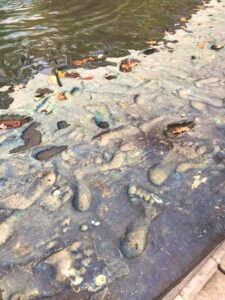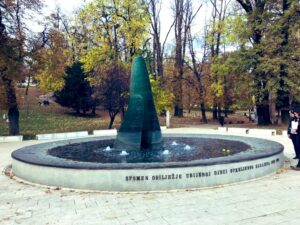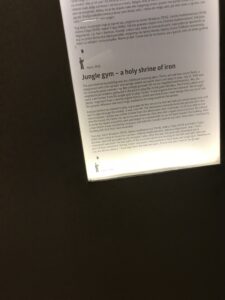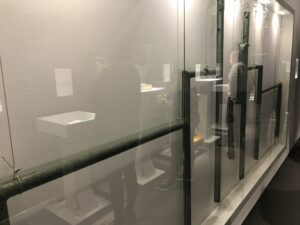Learning from the horrors of the past to heal the divisions of today
by Sarah Robinson Galloway
The War Childhood Museum in Sarajevo is a place of stories, the stories of children growing up in war.
Their stories are attached to items that hold memories of a time wrought with scenes most of us can barely even imagine. Scenes that no child should bear witness to.
What is perhaps surprising is that some of these items and their memories bring a light of hope which shines bright against a backdrop of bloodshed and violence. Many talk about happy moments. There are, of course, stories of loss, but the balance of these paint a picture of children who just wanted to be children, with the same needs and desires as any other child. However, these children were forced to grow up too fast.


Going to Bosnia-Herzegovina, I had not expected to be reminded of my own childhood experiences and those of my family. However, the mangled remains of a jungle gym in a children’s play park brought back a memory I had almost completely forgotten.
It struck me that the power of these stories goes beyond telling one experience, they also connect us. These stories and memories are those of individuals but they are a collective as well. The jungle gym was a story which brought to life the terrible fears I had in one moment of my life growing up in an army barracks in Northern Ireland in the 1990s. What happened to those children could have happened to me and these occurrences were no more than four years apart within the same decade.
All of the stories featured were the stories of children of my generation, some were born the same year I was. This fact hit me even more when visiting the memorial to the children killed during the Siege of Sarajevo. As someone with an interest in European history, I have visited many memorials – some to children. I had never before visited a memorial to children of my generation, a memorial to children who under other circumstances I could have met during this visit to Sarajevo. Children I could have been friends with.
I have found myself questioning why I didn’t know about this piece of recent history. Why was it not talked about when I was at school? I have to guess that by the time I reached secondary school it was no longer reported in local news but was also too recent to have made it into the history curriculum. There is also the fact that I was growing up as an army child in another area of conflict, Northern Ireland. In 1990s, the Troubles were not as prevalent but they weren’t over. In 1996 I was living in Thiepval Barracks when the IRA set off two car bombs, one outside my dad’s office and the other outside the medical centre.
These, however, to me, are not good enough reasons not to have heard about the conflict in Bosnia-Herzegovina. I want to look at how we can change that with young people now but also those of my generation who may have been too young to understand what was happening in the news at that time.
How can we learn from the past if we do not talk about it sooner rather than later? Young people have a right to hear about this so they can make decisions about how they develop their opinions and actions.
We currently live in a time of great uncertainty, we live in a time where political views within our own communities are dividing us. Instead of letting our differing views tear us apart, we absolutely need to look back to move forward and to respect and discuss our opinions rather than fight about who is right.
There has been enough conflict and too many children have died or survived the worst of human nature. It is time to direct our energy into fighting hatred together, to build respect and community cohesion.
It is time for us to create a world where all children can just be children.
This visit to Bosnia-Herzegovina was part of a delegation organised by Remembering Srebrenica Scotland. Find out more about their work at: https://srebrenica.scot/
Sarah Robinson Galloway runs the Action on Prejudice programme at YouthLink Scotland. Find out more about the programme at: www.actiononprejudice.info


